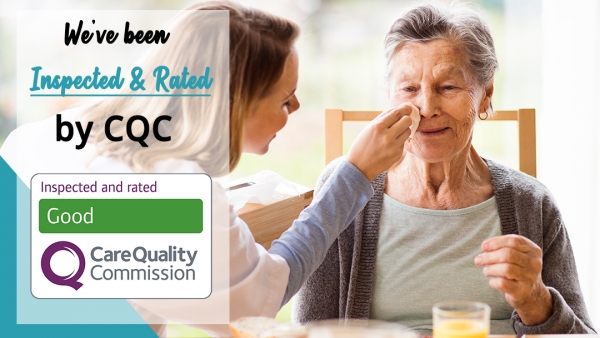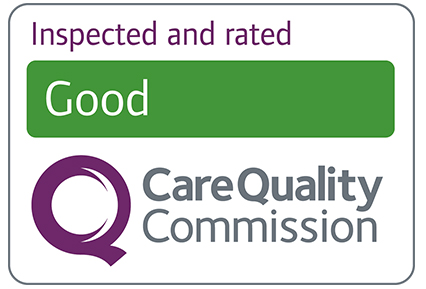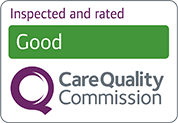It's official - TLTP Care rated GOOD by CQC

CQC registered domiciliary care agency London Teaching Pool Ltd. (known as TLTP Care) have recently been awarded a GOOD rating on their homecare services.
The company began operating in July 2019, however they are not new to healthcare, as their sister company TLTP Medical have been providing staff to the NHS and private sectors for over 15 years.
This was TLTP Care’s second unannounced inspection, the first inspection took place on 8th March 2021 which was a partial inspection on two areas: Safe and Well-Led which were rated Good.
This time, it was a comprehensive inspection covering all five areas, and they were rated GOOD on all.
Is the service safe? Yes. The company was rated Good for the service being safe. This meant people were safe and protected from avoidable harm.
Is the service effective? Yes. The company was rated Good for supporting and promoting a good quality of life. This meant people's outcomes were consistently good, and people's feedback confirmed this.
Is the service caring? Yes. The company was rated Good for supporting and treating people with dignity and respect; and involved as partners in their care.
Is the service responsive? Yes. The company was rated Good for meeting the needs of their service users. This meant people's needs were met through good organisation and delivery.
Is the service well-led? Yes. This meant the service was consistently managed and well-led. Leaders and the culture they created promoted a high-quality, person-centred care.
Background to the inspection
The reason for the inspection is to carry out thorough checks to see if the provider was meeting the legal requirements and regulations associated with the Health and Social Care Act 2008. CQC looked at the overall quality of the service and provided a rating for the service under the Care Act 2014.
The inspection was carried out by one inspector and an Expert by Experience. (An Expert by Experience is a person who has personal experience of using or caring for someone who uses this type of care service).
Notice of inspection
This inspection was unannounced on the first day of inspection. TLTP Care knew we were returning for the second day.
Before the inspection
CQC reviewed information they had received about the service TLTP Care provide. They sought feedback from the local authority and professionals who might work with the service. TLTP Care was not asked to complete a provider information return prior to this inspection. This is information CQC require providers to send to give some key information about the service, what the service does well and improvements they plan to make.
This was considered when CQC inspected the service and made the judgements in their report. We used all this information to plan our inspection
During the inspection
CQC spoke with five people who used the service and six relatives about their experience of the care provided. They also spoke with the registered manager, a care coordinator and two directors for the service. They reviewed a range of records. This included six people's care records. They looked at five staff files in relation to recruitment. They also looked at a variety of records relating to the management of the service.
After the inspection
CQC continued to seek clarification from the provider to validate evidence found. This included speaking to two members of care staff. They looked at further evidence sent to us by the registered manager in regard to staffing and training.
Overall Summary
There were systems and documentation in place to support staff to keep people safe from abuse. When staff had concerns for people's safety, TLTP Care acted appropriately. People's medicines were managed safely. Risks to people were assessed and monitored. Infection prevention and control measures were in place. Lessons were learned when things went wrong to minimise the risk of reoccurrence.
People's needs were assessed before they used the service so the provider knew whether they could meet people's needs. Staff were trained on how to perform their role effectively and were provided an induction before starting employment. They also received supervision and appraisals. People were supported to eat and drink. Staff worked with other agencies to provide effective care and the registered manager referred people to other health care professionals where required.
People were supported to have maximum choice and control of their lives and staff supported them in the least restrictive way possible and in their best interests; the policies and systems in the service supported this practice. People's consent was sought when care was provided.
People and relatives told us staff were caring. People's equality and diversity was respected as was their privacy and dignity. People and relatives were able to express their views about the care provided. People were encouraged to be independent.
Staff had been trained in end-of-life care and people were supported at end of life. Care plans recorded people's needs and preferences and people received person centred care. People's communication needs were met by staff and their communication needs and preferences recorded in care plans. People were supported with activities they wanted to do. People and relatives were able to complain, and the registered manager dealt with complaints appropriately.
There were quality assurance systems in place, so TLTP Care was able to continuously learn and improve, this included gathering feedback from people and relatives. Staff were able to engage with the provider through regular meetings. The service was person centred and people and relatives thought highly of the staff and management. The service worked in partnership with others to benefit people using the service.
The service had systems in place to safeguard people from abuse. Risks to people were assessed and mitigated. Staff were recruited safely and there were sufficient staff available to support people safely. Staff were trained in infection control and there were infection prevention measures in place. Lessons were learnt when things went wrong to minimise the risk of re-occurrence.
The full report can be viewed on the CQC website by following this link https://www.cqc.org.uk/provider/1-6286487820
Lisa Camp, Manager Director of TLTP Care said: “The last year has been a huge challenge for us; from covid restrictions, fluctuating government guidelines, to staff illnesses we’ve had it all. But nonetheless we preserved and continued to deliver high standards of care to our service users. As a team we’ve grown, and I couldn’t be prouder of them. To receive a GOOD rating after a tough two years of operating in a pandemic is a huge testament to our commitment and credibility.”
Onyeka Aniekwena, the Registered Care Manager of TLTP Care concluded: “I am thrilled to receive a ‘GOOD’ rating on all the four areas that were inspected. This gives me great peace of mind knowing we are meeting the high standards set out by CQC and all the efforts from the team are contributing to this success.”
Rita Agada, Care Coordinator of TLTP Care echoed the same feeling: “As the care-coordinator you have to be resilient and ready for whatever comes your way, and there have been many hurdles I have had to overcome. Receiving a GOOD rating makes it all worthwhile and provides me with a great sense of achievement knowing the work I do is making a difference.”
Isobel Gordon, Care Resourcer: “When I found out we were being inspected I felt extremely nervous as this was new to me. Having only joined the company in May 2021 I had to learn the role very quickly as the company were extremely busy. I work in close connection with Rita to ensure the carers have the right skills, attributes and attitude required to care for the patients’ needs. I’m pleased knowing the work I do has contributed to our GOOD rating and that we have some of the very best carers working for us.”






